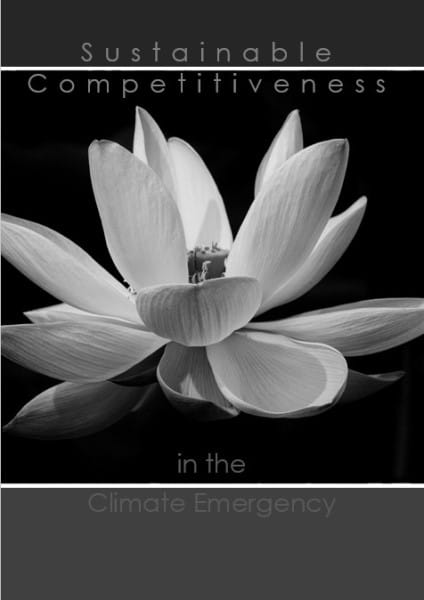The key policies of sustainable competitiveness:
A more sustainable AND more prosperous economy is not an utopia.
Technically speaking, that could be could be achieved fairly simple:
- A global climate tax. Climate change is a gigantic market failure. We need a global climate tax – introduced in phases, paid back to the people in cash and reinvested in a renewable energy infrastructure. A win-win for the economy and the environment – we’ll get cheaper energy and could avoid the looming climate disruption.
- More democracy. The people need to be consulted on policy and law changes through mandatory referenda, and the possibility to induce issues on the governing agenda. Democracy needs to be everywhere, and needs to work a lot faster – which is technically no problem using modern communication technology.
- Better governance. It is highly inefficient to assign responsibility for an entity as complex a country to a single individual. Winner-takes-al voting systems allow minorities to govern. Governing requires compromise. Ministries should be assigned according to national voter share, cabinet meetings are chaired by one of the ministers, in turns. The same applies in the corporate World: we don’t need presidents and we don’t need CEOs; we need teams of decision makers.
- Real market economy. Markets only work when all costs are incorporated. The environmental costs of substances, materials and processes have to be integrated in the market price – based on a globally agreed level. The taxes generated need to be fiscally neutral (cash-back and/or used to offset the environmental cost).
- Quality education for all. We need quality education, equal for all; taxed and re-distributed at the national level so the same resources are available to each student
- Working financial markets. We need financial markets that support the real economy, and not vice-versa. This can be achieved through a transaction tax on, and/or a minimal holding periods for all financial instruments.
- Health care and social security for all. We need affordable basic health care for all – paid for as percentage of income, directly deducted, with the choice of additional insurance for more luxurious health care.
- Impartial and efficient justice system accessible to all. The justice system has to work fast, efficient, accessible to all while minimising abuse. Judges need to be completely impartial, appointed through a process that is safeguarded from any political influence.
- Unitary Taxing. We need a global approach to tax multi-national corporations (e.g. by a combination of revenues/employees/sourcing per country), as well as private tax. These are not normal times. A wealth tax on the rich, maybe for a limited time, needs to be seriously considered.
- Fact-based, impartial information. We need impartial, science- and fact-based information, not opinions. Financed through taxes, but safe-guarded against any control attempts by governments/politicians.
- Freedom for, and from, religion. Faith is a choice. Science is not. Everybody is free to practice their faith, and nobody has their freedom impaired by other people’s faith We need a total separation of state governance and religion.
- Total equality. It is a shame that this has to be mentioned in the 21st century – but we need total equality. Between genders, races, regions, wealth.
Read more in the Report – Sustainable. Competitive.
GDP is insuffieThe wealth of nations is commonly expressed in “Gross Domestic Product” (GDP) or “Gross National Income” (GNI), accounted for in a monetary value. GDP and GNI are composed of the economic output or income of a country, which is composed of financial transactions in exchange for goods and services.
However, economic activities have certain adverse side-effects on the natural environment, resources, and on the socio-cultural and socio-economic fabric of a society. In addition, natural resources are not renewable and many vital resources – water, energy, but also certain minerals and metals – are scarce (or are set to become scarce goods in the near/medium future). Yet none of these adverse effects, external, or “non-financial” aspects are factored into the commonly expression of wealth of Nations, the GDP. In other words – the GDP is a very limited expression of a national balance sheet.
GDP growth rates and changes in growth rates are often used as an indicator for an economy’s well-being and development. However, due to the lack of integrating all aspects of development drivers – natural resources, efficiency, innovation capabilities and social cohesion – the GDP describes a moment in time. Current GDP levels therefore have limited informative value relating to the future potential of achieving and sustaining inclusive development and creation of wealth.
The sustainable competitiveness model incorporates all relevant pillars of sustained growth and wealth creation of a nation – natural capital availability, resource intensity, innovation and business capabilities, and social cohesion.
“Sustainable competitiveness is the ability of a country to meet the needs and basic requirements of current generations while sustaining or growing the national and individual wealth into the future without depleting its natural, intellectual and social capital.”
In addition to the full integration of sustainability performance data, the sustainable competitiveness index also analyses and incorporates the data trends over time to allow for a better expression of the future development potential. The results aim at serving as an alternative to the GDP, and to be used to analyse future development prospects of nations.
Sustainable, Democratic, Competitive

How to achieve more sustainable AND more prosperous societies:12 key policies Sustainable. Competitive.
